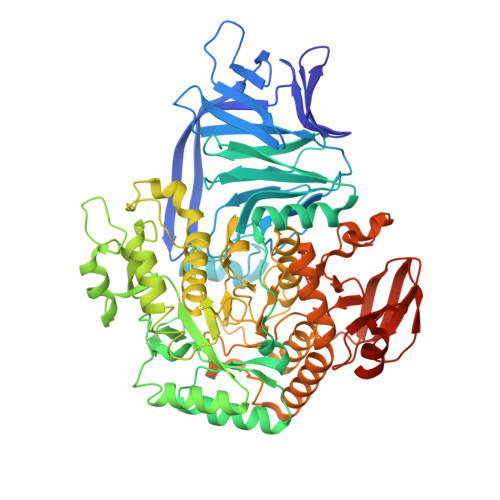Oxidative desulfurization pathway for complete catabolism of sulfoquinovose by bacteria.
Sharma, M., Lingford, J.P., Petricevic, M., Snow, A.J.D., Zhang, Y., Jarva, M.A., Mui, J.W., Scott, N.E., Saunders, E.C., Mao, R., Epa, R., da Silva, B.M., Pires, D.E.V., Ascher, D.B., McConville, M.J., Davies, G.J., Williams, S.J., Goddard-Borger, E.D.(2022) Proc Natl Acad Sci U S A 119
- PubMed: 35074914
- DOI: https://doi.org/10.1073/pnas.2116022119
- Primary Citation of Related Structures:
7BBY, 7BBZ, 7BC0, 7BC1, 7NBZ, 7OFX, 7OFY, 7OH2, 7OLF - PubMed Abstract:
Catabolism of sulfoquinovose (SQ; 6-deoxy-6-sulfoglucose), the ubiquitous sulfosugar produced by photosynthetic organisms, is an important component of the biogeochemical carbon and sulfur cycles. Here, we describe a pathway for SQ degradation that involves oxidative desulfurization to release sulfite and enable utilization of the entire carbon skeleton of the sugar to support the growth of the plant pathogen Agrobacterium tumefaciens SQ or its glycoside sulfoquinovosyl glycerol are imported into the cell by an ATP-binding cassette transporter system with an associated SQ binding protein. A sulfoquinovosidase hydrolyzes the SQ glycoside and the liberated SQ is acted on by a flavin mononucleotide-dependent sulfoquinovose monooxygenase, in concert with an NADH-dependent flavin reductase, to release sulfite and 6-oxo-glucose. An NAD(P)H-dependent oxidoreductase reduces the 6-oxo-glucose to glucose, enabling entry into primary metabolic pathways. Structural and biochemical studies provide detailed insights into the recognition of key metabolites by proteins in this pathway. Bioinformatic analyses reveal that the sulfoquinovose monooxygenase pathway is distributed across Alpha- and Betaproteobacteria and is especially prevalent within the Rhizobiales order. This strategy for SQ catabolism is distinct from previously described pathways because it enables the complete utilization of all carbons within SQ by a single organism with concomitant production of inorganic sulfite.
- York Structural Biology Laboratory, Department of Chemistry, University of York, Heslington YO10 5DD, United Kingdom.
Organizational Affiliation:

















